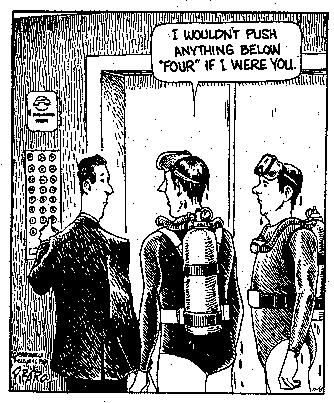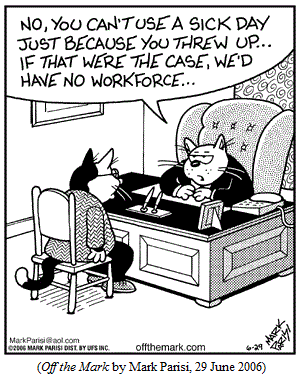


|

|
SOAKED UNDERWATER, NO FIRE IN THE STY: We've had water in the basement a few times before, when the roof gutters got clogged and rain sheeted down the west wall of the house and leaked in through the windows. (I try to check the gutters more often these days.) When it's happened, the water formed a pool in the area between the furnace to the north and the washer and dryer to the south; the pool was maybe two feet by three feet, half an inch deep, more a nuisance than a danger, and evaporated in a day or two.
In mid-September, we noticed a pool like that in the basement, even though it hadn't rained in a few days. Worse, the pool didn't evaporate, or was being added to as fast as it could evaporate, though we never saw any water actually dripping or flowing into it. After a week or so, we called Petro, supplier of our furnace and the oil it burns, and asked if a serviceman could come by and check whether we had a leak. Someone came by, checked it out, and said he'd tightened one bolt that seemed damp, but that he saw no sign of significant leakage. He recommended we check out the sewer line running under the basement.
Digging up a sewer line did not sound like our idea of fun, and with great trepidation I called Jacko, our friendly semi-retired plumber, to ask his help in diagnosing the problem. Jacko (a Haitian gentleman whose given name of Jean-Claude got mangled into his present nickname by Brooklyn residents decades ago) came by, opened up the ports that give access to the U-shaped trap where the sewer line leaves the basement to join the pipes under the street, and verified that we had no blockage there. He said a leak was unlikely where the pool was, if the pipes weren't blocked downstream; besides, the pool didn't stink of sewage. He suspected something was going on with the washer, but I ran a rinse cycle while he was there and saw no new flow. Jacko agreed that digging up the sewer line was the last thing to consider, and suggested I mop up the water (which I'd done once already) and see if we could see any pattern to the subsequent accumulation.
A couple of days later, someone I trust asked me how old the washing machine is, and when I said more than two decades, she told me about "silent leakage"—which can start happening with washing machines as early as a dozen years into their working life, as various parts start to rust out and the rubber gaskets are no longer sufficient to maintain the seals. I decided it was time to call Sears and have a service person come in and check the washing machine for this syndrome.
But before I could get around to doing so, that Thursday night, we were alerted to not a trickle but a flood of water coming out of the furnace. We called the oil company again, with some urgency, and a man came by and agreed that there was certainly a problem here. He was able to shut off the boiler and hence the flow of water. His diagnosis: the boiler was rusted out, after a mere seven years. Why? Leaky radiators. The heating system is supposed to be practically a closed system in which water from the boiler goes up to the radiators as steam, condenses as it gives off heat, and then returns to the boiler. Some inevitably leaks out, perhaps five gallons a month in a well-heated house in cold weather, and the boiler takes more in from the plumbing to replace it. But the fresh water contains dissolved oxygen, and that accelerates the process of rusting, which ultimately destroys the innards of the boiler. He said that after we'd replaced the boiler, we needed to check all the radiators out for leaks and replace them as needed. (All the radiators in the house have been here at least as long as we have.)
The good news was that the boiler, being a mere 7 years old, was still under its 10-year warranty. The bad news was that the warranty didn't cover all the electronics and control mechanisms surrounding the boiler proper, which all got damaged by the leakage. So we ponied up a few thousand dollars the following week to get ourselves a new boiler and associated hardware. We also moved a ton of Stuff around to give access to the radiators to permit inspection for leaks. (That took more work than everything else.)
I'll skip the details of the four extra visits from technicians over the ensuing week and a half to figure out why the boiler kept spewing steam across the basement. (Turned out there was a short in the control electronics.) It all seems to be working now—knock steam-pipe—and all we need now is to replace six or eight radiator valves declared leaky. Time to call Jacko back.
There's been no water on the basement floor since the boiler was replaced, so I guess the washer is all right after all. We're due for an annual maintenance visit, though, so we can get an inspection for leakage just to be sure.
EARLY RELEASE PROGRAM: Wednesday afternoon 26 October, Landon, the contact I nominally reported to at the online fashion company, stopped me as I was heading back to my desk from the bathroom and told me the news: the home office in London had decided to cut some costs by having the people there do more of the proofreading (or subediting, as they call it). Consequently, the company would no longer need my services as of the end of that week. He added that this was not a reflection on my work, which had been entirely satisfactory. He added that it was possible that the workload might turn out to be more than the home office could handle, and in that case I might hear from the company again in weeks or months, asking me to come back on a part- or full-time basis, but that was certainly not guaranteed.

|
INFELICITOUS DEVELOPMENT: HeiferCat is not doing well, I'm sorry to report. Earlier this year she was plagued by a persistent fungal infection that caused much of her fur to fall out, and required several veterinary visits and both external and internal medication to vanquish. But follow-up visits turned up new symptoms—anemia, and neuropathy in her
 rear legs—that required more (and pricey) diagnostic processes, and we have now been informed that she has a couple of tumors on her liver and a cyst on her pancreas. The tumors and the cyst are benign and slow-growing, and the anemia has responded to treatment; nonetheless, the vet is estimating her life expectancy in months. (We still don't know the cause of the neuropathy, and won't without an even more expensive MRI procedure. The vet says that even if we did, treatment would require surgery, and her condition is fragile enough to cast serious doubt on her surviving it.)
rear legs—that required more (and pricey) diagnostic processes, and we have now been informed that she has a couple of tumors on her liver and a cyst on her pancreas. The tumors and the cyst are benign and slow-growing, and the anemia has responded to treatment; nonetheless, the vet is estimating her life expectancy in months. (We still don't know the cause of the neuropathy, and won't without an even more expensive MRI procedure. The vet says that even if we did, treatment would require surgery, and her condition is fragile enough to cast serious doubt on her surviving it.)
She's fairly old for a house cat (15 years and some months), so all this is not totally unexpected. The vet has prescribed a number of medications, with the help of which we hope she can enjoy quality of life at least until Ethan gets back next summer.
 Comments on APA-NYU, Volume 9, #10 (e-APA-NYU #90)
Comments on APA-NYU, Volume 9, #10 (e-APA-NYU #90)

|
>Portions of the preceding voted the other day, but aren't sure why.<